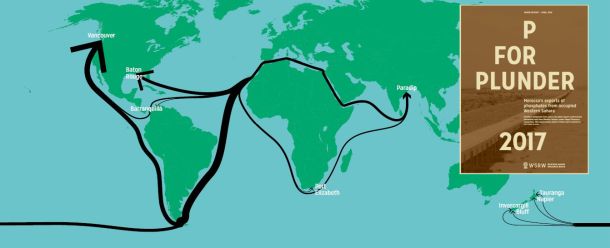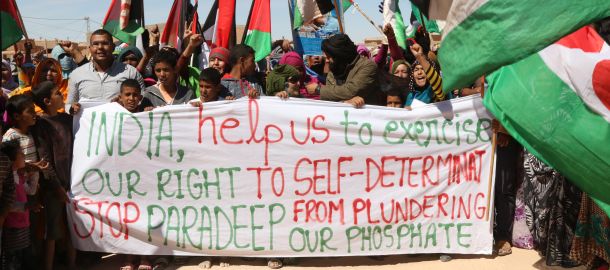
WSRW launches today its overview report containing all clients that have last year purchased phosphate rock from Western Sahara. The report details all volumes, values and shipments relating to Morocco’s exports from the occupied territory during 2014.
Western Sahara Resource Watch had today published a detailed overview of all companies that during 2014 purchased phosphates from occupied Western Sahara. The report was today launched in an event in Wellington, New Zealand, the third biggest of the involved importing countries.
The phosphate rock is illegally exploited by the Moroccan government in Western Sahara, a territory that it brutally invaded and annexed in 1975. To date, the sales are Morocco’s main source of revenues in the occupied territory. The Saharawi people have consistently spoken out against the trade.
Through tracking and analyzing all ship traffic in the port of El Aaiun, occupied Western Sahara, WSRW is able to present a complete list of shipments of phosphate from the territory for calendar year 2014. The organization attributes the purchases to nine identified and one unknown importers in nine countries around the globe. Between the two of them, the companies Agrium Inc (Canada) and Lifosa AB (Lithuania) accounted for 58 percent of all purchases from Western Sahara.
Download the report here. (3 Mb).
The report puts the total exported volume in 2014 at 2,1 million tonnes, corresponding to an estimated value of US $230 million, shipped in 44 bulk vessels. In 2014, Morocco commenced exploiting the second layer of Western Sahara's phosphate deposits, as the first layer - which was of much higher quality and value - has practically been sold off completely.
WSRW also highlights the law firms that are working to defend Morocco's exploitation of Western Sahara's phosphate mine. These law firms - Covington & Burling, DLA Piper and Palacio y Asociados - have produced legal opinions which allegedly state that Morocco's activities are perfectly lawful as they are to the benefit of the Saharawis. Though these opinions have been circulated to importers and their investors, they are kept from the Saharawis.
Of the nine identified importing companies in 2014, five are listed on international stock exchanges or are majority owned by enterprises which are listed. All have been subject to blacklisting by ethically concerned investors due to this trade.
"We urge all importers to immediately halt their involvement", stated Sara Eyckmans, coordinator of Western Sahara Resource Watch.
"Such trade is deeply unethical, as it directly undermines the UN peace efforts. It is taking place in violation of the Saharawi people's legitimate right to manage their own resources. The Saharawis have a right to self-determination over their land and resources, and both Morocco and the involved companies don't seem to care at all", Eyckmans stated.
Of the remaining four companies that are not registered on any stock exchange, two are farmer owned cooperatives in New Zealand, while the two remaining are fully or partially owned by the Government of Venezuela.
The report is an updated version of the P for Plunder report published in 2014, which was based on shipping data from 2012 and 2013. Further details on correspondence with the companies, and a list of companies “under observation”, are found in the last year’s report.
The report can also be downloaded in print format (14 Mb)
New report: Western Sahara phosphate trade halved
The export of phosphate rock from occupied Western Sahara has never been lower than in 2019. This is revealed in the new WSRW report P for Plunder, published today.
New report on Western Sahara phosphate industry out now
Morocco shipped 1.93 million tonnes of phosphate out of occupied Western Sahara in 2018, worth an estimated $164 million, new report shows. Here is all you need to know about the volume, values, vessels and clients.
New report on contentious Western Sahara phosphate trade
Morocco shipped over 1.5 million tonnes of phosphate out of occupied Western Sahara in 2017, to the tune of over $142 million. But the number of international importers of the contentious conflict mineral is waning, WSRW's annual report shows.
New report on global phosphate trade from occupied Western Sahara
Over 200 million dollars worth of phosphate rock was shipped out of occupied Western Sahara last year, a new report from WSRW shows. For the first time, India is among the top importers.



